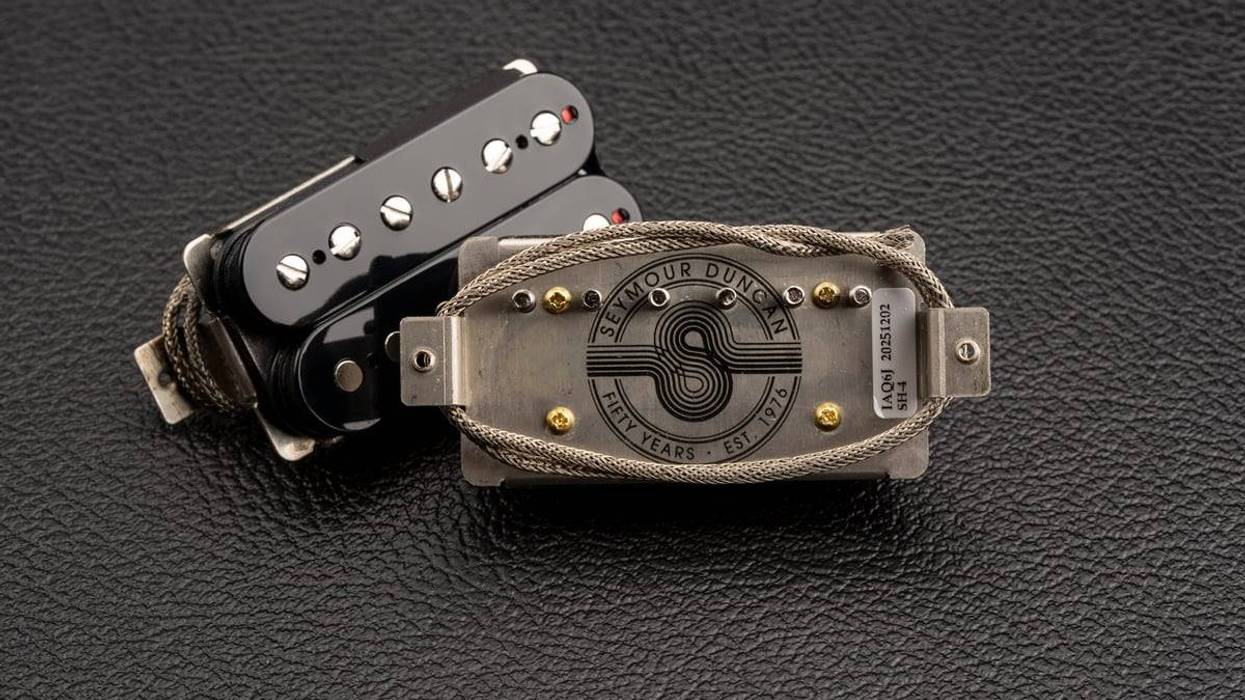There’s a moment in the documentary Sirens when Blaakyum’s Bassem Deaibess declares that heavy metal is “100 percent pure sacrifice.” Deaibess says this to Shery Bechara, one half of the guitar tandem in Slave to Sirens, the all-women thrash-metal band from Lebanon who are the focus of the new film, directed by Rita Baghdadi. Deaibess was a close friend to Slave to Sirens in the band's early days. “I think what he meant by that was, you give a lot, for a long time, and don’t expect anything in return, especially if it’s here in Lebanon,” explains Bechara. “There’s so much sacrifice.”
Though much of Sirens ultimately focuses on guitarist Lilas Mayassi’s coming out, and how that inadvertently creates turmoil with her bandmates, Baghdadi’s deft filmmaking simultaneously captures just how challenging it is for a band like Slave to Sirens to even exist in the Middle East, much less grab the proverbial brass ring. Aside from the familiar struggles one might encounter in pursuit of a music career (or any artistic endeavor, for that matter), Slave to Sirens finds themselves face-to-face with cultural dogma, political protests, regional unrest, catastrophic disasters, and limited opportunities. The film is a metaphorical back-and-forth between the band’s own struggles and societal dysfunction writ large, but the magnitude of their quest is perhaps best amplified when Bechara’s father, Roger, tells her that less than one percent of the population in the Middle East listens to metal. You could make the argument that heavy metal is a fairly marginalized musical genre in the United States, but in the Middle East, a queer, all-female thrash-metal band is literally an against-all-odds gambit.
And yet, through sacrifice, fierce commitment to their ideals (some of which emerge throughout the film), and perseverance, Slave to Sirens starts to gain some traction within the metal community, particularly outside of Lebanon. Their performance at Glastonbury Festival in 2019 is a pivotal moment in the film. Solicited by Earache Records to perform on one of their stages, it is Slave to Sirens’ first international gig, and a seemingly triumphant opportunity. Their time slot, however, runs simultaneous with a Babymetal performance on one of the main stages, so they are left playing to a single-digit audience. Baghdadi artfully crafts an emotional rollercoaster from such bittersweet moments. Think ABC’s “The thrill of victory … and the agony of defeat” slogan from Wide World of Sports in the 1970s—disappointment and exaltation abound equally.
Slave To Sirens - Salomé (OFFICIAL MUSIC VIDEO)
“Glastonbury was an amazing experience, and we learned a lot from it,” says Mayassi, who seems far more upbeat about it now than she did in the film. “We were unlucky in the time slot, but we didn’t really care, because the point for us was just performing and having fun.” It’s been about four years since Sirens was shot, so distance clearly provides some perspective.
“I think whatever happened with us, especially with the revolution and the port explosion, it just stays there—it stays and inspires, and everything that happens affects us personally and musically.”—Lilas Mayassi
Slave to Sirens was formed by a chance encounter between Bechara and Mayassi in 2015 in Lebanon during an anti-government protest regarding a waste management crisis. In 2018, they independently released their debut EP, Terminal Leeches, which pricked up some ears around the globe, leading to the invitation from Earache to perform at Glastonbury. Lyrically, the band addresses much of the societal strife that seems to plague the Middle East. Musically, the songs are infused by the thrash and death metal influences of their youth, and Mayassi and Bechara both attack their instruments with a kind of swagger that belies their years.
Shery Bechara's Gear

Bechara is the lead guitarist in Slave to Sirens, but both she and rhythm guitarist Mayassi write equally and switch on parts whenever the mood takes over.
Photo by Sally Mïre
Guitars
- Vox Custom 25
- Dean Dime Razorback Slime Bumblebee
- Dean Exile Select 7-string Multiscale
Amps
- Peavey Heritage VTX Series 12-watt 2x12 combo
Effects
- Line 6 POD HD500 multi-effect/amp modeler
Strings and Picks
- Fender 250R Nickel-Plated Steel .010–.046 strings
- D’Addario Regular Light XL .010–.046 strings
- Ernie Ball 2215 Skinny Top Heavy Bottom Slinky .010–.052 strings
- Dunlop Ultex Jazz III 1.38 mm picks
- Dunlop Primetone Jazz III 1.4 mm picks
- Dunlop John Petrucci Jazz III 1.5 mm picks
- Levy’s Leathers guitar straps
- D’Addario Planet Waves cables
The guitar playing is tight and tenacious, featuring quirky, unexpected rhythmic patterns courtesy of Mayassi, and nuanced melodic note choices and phrasing from Bechara. In 2022, the band, which also included bassist Alma Doumani, drummer Tatyana Boughaba, and singer Maya S. Khairallah, released the bludgeoning single “Salomé,” but as of January 1, 2023, they announced on social media that Khairallah and Boughaba had left the band, and introduced Anita Tóth from Hungary as their new lead singer. There’s been no official announcement yet regarding their new drummer. According to Mayassi, they’ve currently tracked about 80 percent of the guitars and bass for a new album. “We have new members,” she clarifies. “So, we’re trying to finish the vocals.” She says they’re mixing at Dyne Engine Studio in Italy with Manuele Pesaresi, who worked with them on Terminal Leeches.
“I think what he meant by that was, you give a lot, for a long time, and don’t expect anything in return, especially if it’s here in Lebanon.”—Shery Bechara
According to the film credits, Mayassi and Bechara occupy fairly distinct roles in Slave to Sirens—Mayassi is billed as the rhythm guitarist, while Bechara is billed “lead guitar.” Mayassi admits that she’s mostly fascinated by the rhythmic aspects of a song. “My focus always shifts to the drums and bass,” she explains. “Shery is more about the soloing and all the dynamics that truly animate a song—she adds the color.”
Bechara describes Mayassi’s style as rough and very thrashy. “She loves the ‘djent, djent, djent,’” she says. “I like that, too, but she has a different approach to it than me. Also, she’s really good on the clean parts, with chorus and vibrato—I see something in her eyes. It’s like, ‘Mm-hmm [laughs].’”
Lilas Mayassi's Gear

Mayassi started playing guitar at age 13, and would spend hours at an internet cafe studying shredders on YouTube.
Photo by Sally Mïre
Guitars
- DBZ Venom Flying V
- Dean Thoroughbred Select
Amps
- Marshall MG30FX 30-Watt 1x10 combo
- Marshall JCM800 2203X 100-watt head
Effects
- Electro-Harmonix Memory Man XO Analog Delay/Chorus/Vibrato
- DigiTech DF-7 Distortion Factory
Strings and Picks
- Ernie Ball Regular Slinky .010–.046 strings
- Ernie Ball Power Slinky .011–.048 strings
- Dunlop John Petrucci Jazz III 1.5 mm picks
Despite such seemingly clear-cut differences in how they approach guitar parts, there is a moment in the documentary when the two are working on a song idea and Mayassi is playing the single-note melodic phrases, while Bechara backs her up on rhythm. So clearly there’s some wiggle room when inspiration strikes. “Whenever I feel like I have an idea, I’ll solo over it,” says Mayassi. “If Shery has an idea, she solos over it. We just go with the flow, whatever we feel like [laughs].”
Both Mayassi and Bechara picked up the guitar in their teens and were mostly self-taught. Mayassi started playing when she was just 13. “I didn’t have access to guitar lessons or anything, so I relied more on a friend in high school who would take pictures of his playing and I would mimic his finger position on the fretboard,” she explains. She would also go once a week to an internet cafe to watch hours of guitar shredding on YouTube. “That was the turning point for me. I started learning, through the videos—that’s what I had access to.” Today, she holds a bachelor’s degree in music education from Lebanese University (LU).
Bechara says she learned from her dad but is also mostly self-taught. She did study for a month at a music school and wants to go back. “I want to learn more things and improve,” she says. “There’s always something to learn. I’m trying to get into music theory and put technique with it.”

Terminal Leeches is the 2018 debut EP by Slave to Sirens, and was recorded at Dyne Engine Studio in Castelfidardo, Italy, with Manuele Pesaresi. The band is currently putting the finishing touches on a new album at Pesaresi’s studio.
As for influences, Bechara says her dad was into rock, blues, and jazz, so those genres influenced her as she was starting out, but she quickly got into heavy metal. “[My dad] never was into metal,” she chuckles. “He used to tell me, ‘You’ll get over it,’ but when he saw how committed I was, and he heard a few bands that I listened to, like Iron Maiden and Carach Angren, he was like, ‘Okay, the riffing on the guitar is very, very good,’ but he’s not into the growling [laughs].”
“I didn’t have access to guitar lessons or anything, so I relied more on a friend in high school who would take pictures of his playing and I would mimic his finger position on the fretboard.”—Lilas Mayassi
Mayassi lists Joan Jett as perhaps her biggest inspiration, but also name-checks Alexi Laiho from Children of Bodom, Steve Vai, and Joe Satriani. “Then I fell in love with thrash and death metal,” she says. “So, it’s like Testament, all the ‘Big Four’ bands [Metallica, Megadeth, Slayer, and Anthrax], and Death, the band.”
Aside from musical influences, Mayassi raises the specter of inherited trauma in the film and the impact that has had on their personal and professional lives. “My parents were kids back when the civil war started [in 1975],” she says. “They were affected by what happened, and that trauma, that fear—it’s some kind of pessimism. These events leave some kind of a scar that doesn’t really go away. The body stores trauma, and it appears in the form of stress. And now, I think whatever happened with us, especially with the revolution and the port explosion, it just stays there—it stays and inspires, and everything that happens affects us personally and musically.”
YouTube It
Sirens is a documentary that follows the Lebanese metal band Slave to Sirens as the five members fight to make a path in music while dealing with societal and personal conflict in their home country.
As for her coming out while shooting the documentary, Mayassi says, “One of the main reasons I felt unapologetically myself in this documentary is because I had the girls with me.” But in a culture that essentially prohibits same-sex relations, and LGBTQ rights are fairly nonexistent, Mayassi admits to being concerned about the fallout from the film. “When the film was released, I started realizing, ‘Okay, I think it’s going to be a problem,’” she says. “We had a lot of tough conversations with Rita. We were lucky that she was able to understand where we come from, and our concerns were respected. But when the film happened to spotlight me and my friends, first I had concerns about their safety, and then the safety of the band. So, at the start, we didn’t feel bad, but during the last years of filming, we started being aware more and more.”
The documentary closes out with the aptly titled Sound of Resilience concert, which was organized by Baalbeck International Festival, and led by conductor Harout Fazlian and the Lebanese Philharmonic Orchestra. It took place on July 5, 2020, at the Temple of Bacchus. Both Bechara and Mayassi are featured on guitar during a performance of Led Zeppelin’s “Kashmir.” It’s an auspicious moment, in a stunning setting, that seems to foretell a promising future for the two of them. “It was a new experience and a huge honor,” says Bechara. “Actually, playing with an orchestra was something like a dream.”





















![Rig Rundown: Russian Circles’ Mike Sullivan [2025]](https://www.premierguitar.com/media-library/youtube.jpg?id=62303631&width=1245&height=700&quality=70&coordinates=0%2C0%2C0%2C0)






